)_tankless.jpg?cx=1265&cy=0&cw=468&ch=625)
How Long Do Water Heaters Last? Everything You Should Know
Table of Contents
Article Summary
Water heaters don't last forever. Most residential units run for 10 to 15 years before needing replacement. Commercial systems in restaurants, hotels, and office buildings typically last 15 to 20 years with regular upkeep.
This guide explains what makes commercial and residential water heaters different, why they fail, and how to spot the warning signs before yours stops working. You'll learn what affects lifespan, how to extend it through maintenance, and when it makes sense to replace your system.
What Determines the Lifespan of a Water Heater?
Several factors influence the lifespan of a water heater, including the type of water heater, the fuel source it uses, how it's maintained and even the quality of its water supply. In answering the question, "How long do water heaters last?" it's typically between 8 and 20 years but can vary significantly based on these factors.
Type of Heater
The type of water heater you have can influence water heater life expectancy. Some models, for example, are more susceptible to corrosion or sediment buildup. These vulnerabilities may not be obvious or explained to you at the time of purchase. Therefore, it's important to understand the type of water heater you have so you can estimate its lifespan and plan for its future replacement.
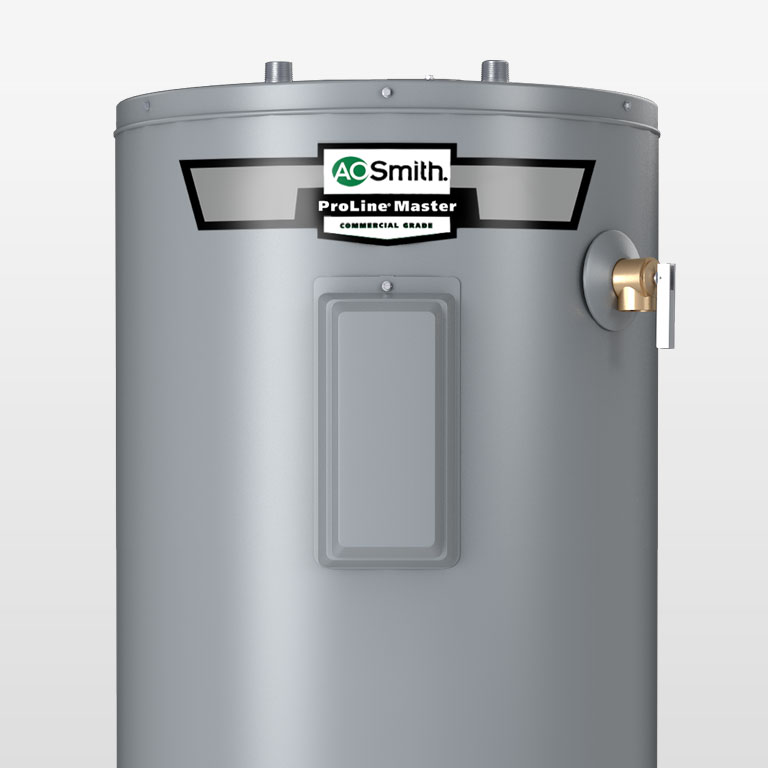
Traditional Tank
Traditional tank water heaters are the most common type of hot water heater. These systems store and heat water in a large separate tank. The water is heated at least once a day to ensure a steady and ready supply of hot water. On average, these water heaters last between 8 to 12 years. They're often affected by sediment buildup. Annual flushing of the tank can help to extend a tanked water heater's lifespan.

Tankless
Tankless water heaters, also known as on-demand water heaters, heat water directly without the use of a storage tank. They're growing more and more popular among homeowners as they boast excellent energy efficiency and have an average lifespan of around 20 years.
Because they have no storage tank, there's no sediment or corrosion to affect their longevity. Additionally, because tankless heaters heat water on demand, they're less likely to experience the wear and tear associated with constant heating and reheating.
Your Water Heaters Fuel Source
The type of water heater you have can influence water heater life expectancy. Some models, for example, are more susceptible to corrosion or sediment buildup. These vulnerabilities may not be obvious or explained to you at the time of purchase. Therefore, it's important to understand the type of water heater you have so you can estimate its lifespan and plan for its future replacement.
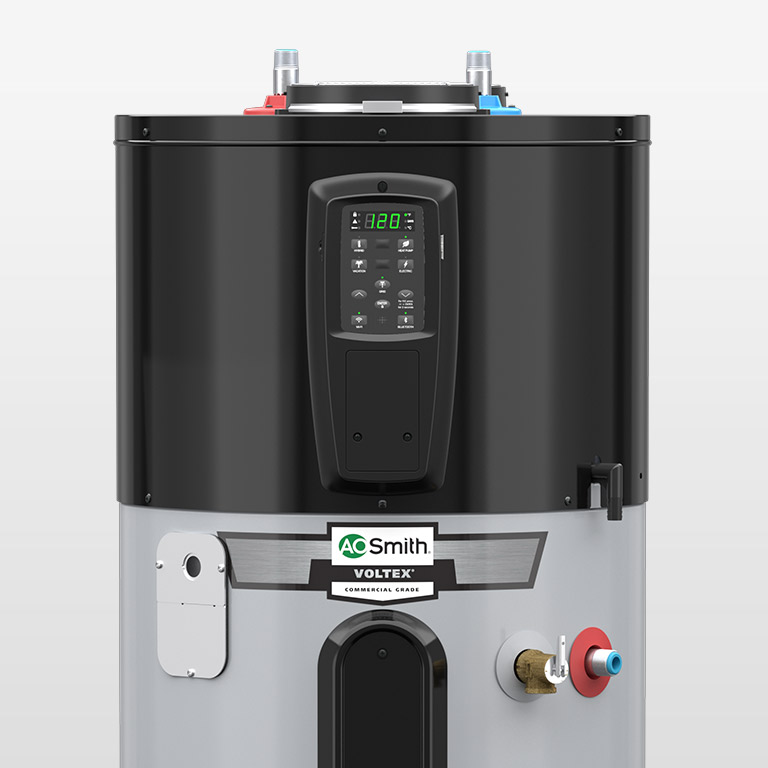
Electric
Electric water heaters are popular for their simplicity and safety. They generally last between 10 to 15 years. Regular maintenance and element replacements can help maximize their lifespan.
- Check out our Electric Tank Water Heaters
- Check out our Electric Tankless Water Heaters
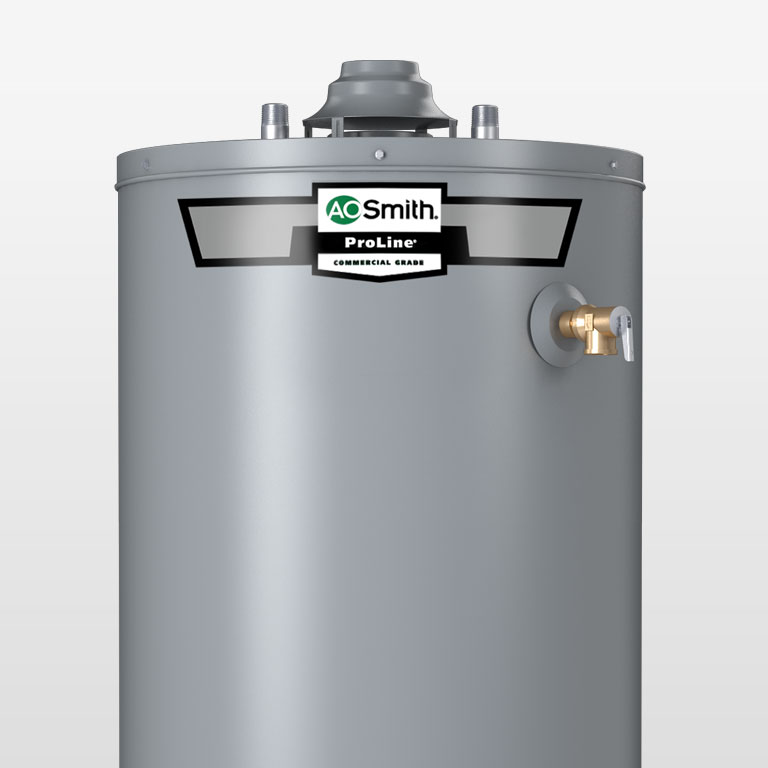
Gas
Gas water heaters are often preferred for their quick heating ability. They tend to last about 8 to 12 years. Annual inspections and maintenance visits are crucial for safety and efficiency, especially for the burner and venting system.
- Check out our Gas Tank Water Heaters
- Check out our Gas Tankless Water Heaters
Why Do Water Heaters Fail?
There are several reasons why water heaters fail, requiring repair or replacement. Early intervention and regular maintenance can often extend water heater lifespan.
Common Causes of Failure (All Types)
Hard Water Deposits and Obstructions
Minerals can build up in your water heater, especially if you have hard water. These deposits can potentially clog pipes and reduce efficiency. While the problem can often be resolved with cleaning and descaling, severe cases could require the replacement of components or a system overhaul.
T&P Valve Failure
The temperature and pressure (T&P) relief valve is a critical safety feature that releases pressure if it gets too high inside the tank. Over time, this valve can suffer wear and tear and eventually fail completely.
Corrosion
Rust and corrosion can wreak havoc inside your water heater, leading to system damage and leaks. Once corrosion sets in, it can be difficult to fix. While patching up rusted areas can provide a temporary solution, a replacement will usually be required down the line.
Anode Rod Failure
Often known as a "sacrificial" rod, the anode rod is designed to protect the metal tank from corrosion. It does this by attracting corrosive elements in the water, causing the rod to corrode instead of the tank. Over time (around 3 to 5 years), the anode rod will wear out and require replacement.
Water Pressure Is Too High
Excessive pressure can put a lot of stress on your water heater, leading to failure and premature replacement. The installation of a pressure-reducing valve or an expansion tank can solve this problem.
System Is Overloaded or Overworked
Your water heater is in high demand throughout the day. Continuous overuse can put strain on your system, leading to premature failure. This often calls for a system upgrade or replacement with a water heater that better suits the needs of your household.
Loose Pipe Fittings
Loose pipe fittings can cause leaks, leading to water damage. If caught early, these issues can often be rectified. However, ongoing problems can cause extensive damage, requiring more extensive repairs or system replacement.
Old Age
Despite regular maintenance and timely repairs throughout its lifetime, there will be a time when your water heater naturally wears out.
Faulty Thermostat
A problem with your thermostat can result in inconsistent water temperatures or complete loss of control of your water heater. A new thermostat will usually solve the issue.
Thermal Expansion
Lack of a thermal expansion tank puts stress on the tank and parts of your plumbing. As water is heated, it expands. Without an expansion tank, the water heater will fail due to this stress.
Tank Water Heater Failures
Storage Tank Is Rusted or Damaged
One of the most common causes of premature failure of a tank water heater is rust. Corrosion is a silent killer, occurring from the inside due to constant contact with water and sediment. As the rust takes hold, it causes weak spots on the inside of your tank, leading to leaks and water damage.
Tankless Water Heater Failures
Heat Exchanger Leaks
While tankless water heaters don't have a tank, they can still be vulnerable to leaks. A common cause of leaks in tankless models is a faulty heat exchanger due to a lack of maintenance. These parts can be complex to repair, and replacement is often an easier and more economical solution.
Electric Water Heater Failures
Faulty Electrical Connections
Electric water heaters depend on reliable power connections to operate correctly. A faulty connection can lead to a number of problems, including intermittent hot water, no hot water or potential safety concerns.
Gas Water Heater Failures
Ignition System Failure
If you've just woken up to no hot water, it could be the ignition system that's at fault. This system is responsible for lighting the gas burner that heats your water. The problem could be down to a malfunctioning pilot light, a faulty igniter or an issue with the control valve.
Improper Exhaust Ventilation
Proper exhaust ventilation is crucial for the safe operation of your gas water heater. It's essential that toxic gasses, such as carbon monoxide, are expelled efficiently. A problem with exhaust ventilation can lead to dangerous conditions and requires immediate attention.
Gas Leaks
Water heater gas leaks can pose a serious safety hazard and need immediate attention. These leaks can occur due to faulty valves, corroded or loose connections, or a worn gas line.
Commercial Water Heater Failures
Commercial water heaters deal with problems most homeowners never think about. A restaurant running dish machines all day, a hotel with guests checking in at all hours, or a school with hundreds of students washing hands between classes—these buildings need hot water constantly. That kind of non-stop use wears down systems faster than a typical home ever could.
Scale buildup becomes a bigger issue in commercial settings. Hard water minerals stick to heat exchangers and tank walls, and when you're heating massive amounts of water every day at higher temperatures, those deposits pile up quickly. Left alone, scale clogs pipes, makes heating less efficient, and eventually damages the system. Treating your water and descaling regularly saves you from shutdowns and having to replace equipment years before you should.
Getting the size right matters more in commercial buildings than most people realize. Too small, and your water heater runs constantly, cycling on and off dozens of times a day just trying to keep up. Too big, and you're wasting energy while the system struggles with irregular operation. Either way, all that starting and stopping beats up components much faster than steady use does. Having a professional calculate your actual hot water needs helps your system run smoothly and last longer.
A. O. Smith's Pro-Size program helps contractors and engineers figure out the right capacity for hotels, restaurants, office buildings, and other commercial properties based on real usage patterns.
Signs Your Water Heater Is Nearing the End of Its Lifespan
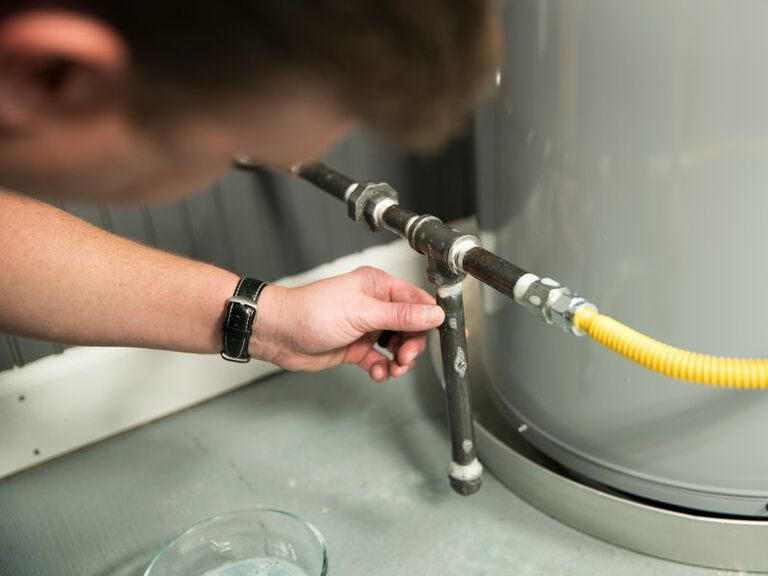
Check the Serial Number (Age)
Your water heater's age is your first indication of its remaining lifespan. Most heaters have a lifespan of 8-20 years. The serial number (usually found on a sticker on your unit or in your manual) often includes the date of manufacture.
Visible Rust or Damage
Rust, either on the tank exterior or in the water itself, suggests internal corrosion, a sign the tank may soon start leaking. External damage could also be indicative of potential internal issues.
Inconsistent Water Temperature
Fluctuations in water temperature or a consistent failure to reach the desired heat level can indicate element or thermostat failure in electric heaters or burner issues in gas heaters.
Discoloration or Deposits in Water
Murky, discolored water or visible sediment can suggest rusting inside the tank or a buildup of minerals, indicating the unit is deteriorating internally.
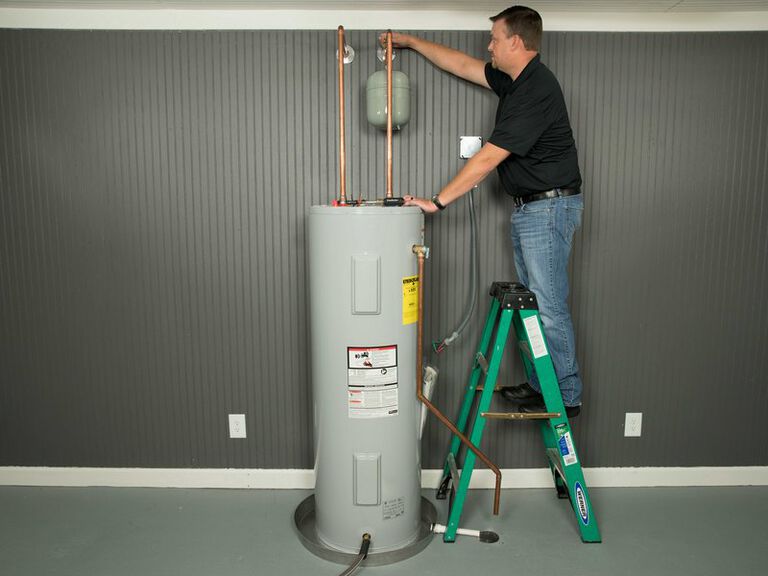
Water Smells or Tastes Bad
Unpleasant odors or tastes in the hot water can be a sign of bacterial growth inside the tank, often due to sediment buildup providing a breeding ground for bacteria.
Loud Noises
Banging, rumbling or popping noises can be caused by the buildup of sediment at the bottom of the tank, indicating that the water heater is working harder than normal and may be close to failing.
Water Leaks
Any signs of leaking around the water heater, whether from the tank itself, the fittings or pipes nearby, can indicate the tank is failing or connections are loose or corroded.
Why You Should Replace Your Water Heater Before It's Too Late
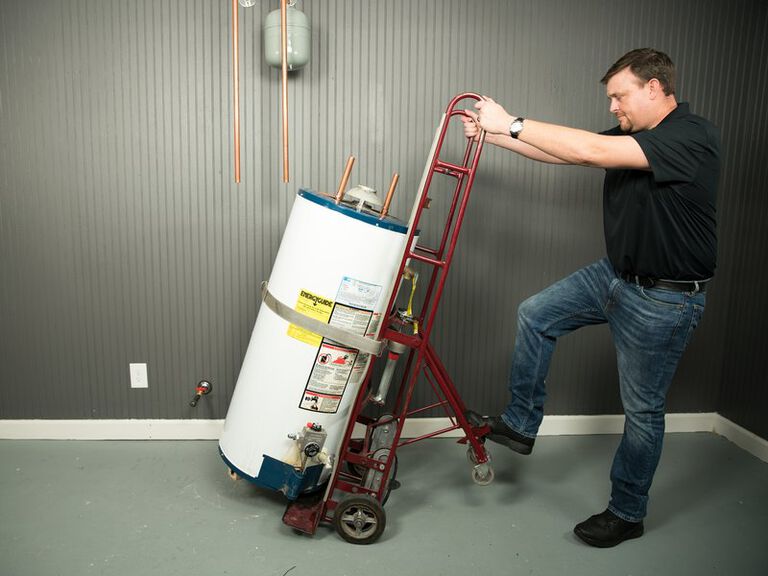
Protect Your Home From Water Damage
An old or malfunctioning water heater poses a risk of leaking or bursting, which can cause significant water damage to your home. By replacing it before it fails, you can prevent costly damage to floors, walls and personal property.
Avoid the Stress and Cost of Emergency Repair or Replacement
Emergency repairs or replacements can be stressful and often more expensive.
A planned replacement with an authorized service provider will ensure you choose the right water heater for your needs.
Take Advantage of Energy Savings & Improved Performance
New water heaters are generally more energy-efficient and perform better. Upgrading your unit can lead to savings on your energy bills and provide a more consistent supply of hot water.
How Long Do Commercial Water Heaters Last Compared to Residential?
Commercial water heaters typically last 3-5 years when maintained properly. They're built tougher than residential models because constant use in busy buildings demands heavier-grade materials and stronger construction. A commercial unit in a hotel or restaurant gets more use in a week than most home water heaters see in a month, so manufacturers design them to handle that punishment.
Residential water heaters usually last 10 to 15 years. Residential models are sized and built for typical household needs: morning showers, evening dishes, weekend laundry. With regular maintenance like flushing the tank annually and checking the anode rod, homeowners can get the most years out of their system.
Several factors affect how long both types last. Hard water with lots of minerals wears down any water heater faster. Installation location matters too; a unit in a temperature-controlled mechanical room will outlast one sitting in a damp basement or a scorching attic. The type of water heater you choose also plays a role. Tankless models, for example, often last longer than traditional tank systems because they don't deal with the same sediment and corrosion issues.
For homeowners trying to figure out what size system they need, A. O. Smith's XPERT Residential Water Heater Selector walks you through simple questions about your household to recommend the right fit. Contractors working on commercial projects can use the Pro-Size program for more complex calculations.
Extending Your Water Heater’s Lifespan
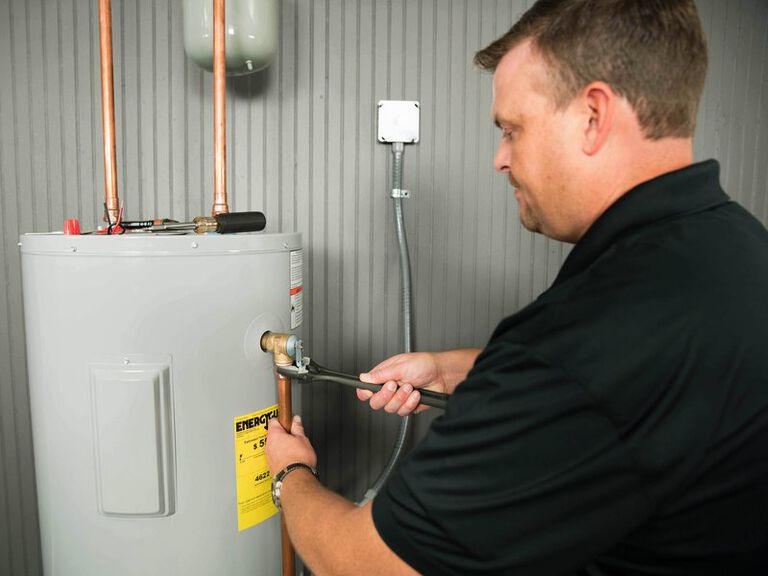
Flush the Tank at Least Once a Year
Flushing the tank helps remove sediment that builds up over time, which can cause corrosion and reduce heating efficiency. Regular flushing prolongs the life of the heater and maintains its performance.
Regularly Inspect Key Components and Replace Them if Necessary
Regular inspections can identify wear before it leads to bigger problems. Knowing what to look for and when to repair or replace components is key to extending the life of your water heater.
Pressure Relief Valve
This valve releases pressure from the tank to prevent it from getting too high. Regular checks will ensure it is functioning correctly.
Anode Rod (Replace if Badly Corroded)
The anode rod is designed to corrode over time to protect the tank from rust. Proactive checking and replacement can significantly extend the life of your water heater.
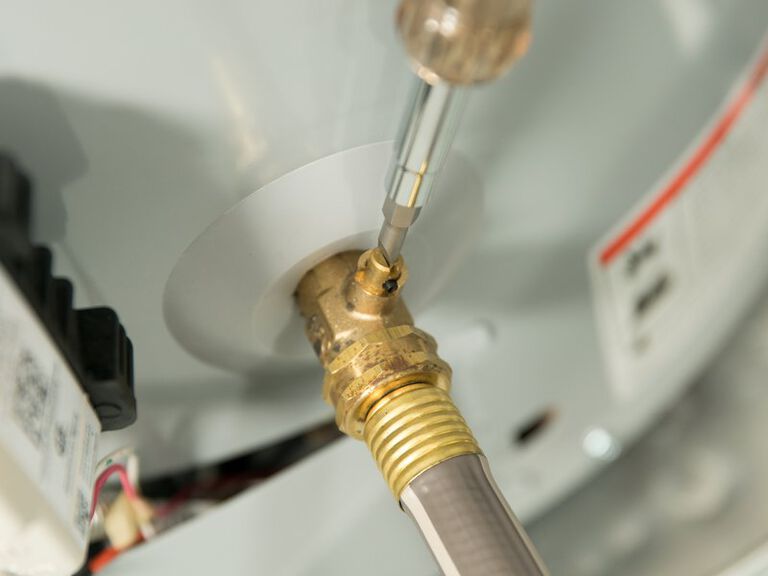
Tank (Check for any Cracks, Leaks and Rust)
Regularly inspect the tank for signs of cracks, leaks or rust. Early detection of these issues can prevent more severe problems, like major leaks or water damage. If you notice any of these signs, it may be time to repair or replace the tank.
Pilot Light/Ignition System (Gas)
For gas water heaters, ensure that the pilot light or ignition system is functioning correctly. A malfunctioning pilot light or ignition can lead to inefficiency or a complete shutdown of the heater. Regular checks can prevent these issues.
Water and Gas Lines
Inspect the water and gas lines connected to the heater for any signs of leakage, corrosion or damage. Maintaining these lines in good condition is essential for the safe and efficient operation of the heater.
Install a Thermal Expansion Tank
Installing a thermal expansion tank can help manage the pressure caused by thermal expansion in a closed water system. This can prevent excessive pressure on your water heater, extending its life and preventing potential damage.
Insulate the Tank and Pipes to Prevent Condensation
Insulating the water heater tank and pipes helps maintain the water temperature, reduces energy costs and prevents condensation, which can lead to rust and corrosion. This simple measure can significantly improve efficiency and prolong the life of the heater.
Improve Your Water Quality With a Softener or Filtration System
Hard water can lead to faster sediment buildup and corrosion in your water heater. Using a water softener or filtration system can improve water quality, reducing these risks and extending the life of your water heater.
Opt for an Extended Warranty from the Manufacturer
Selecting the right water heater is the first step in the replacement process. You might also want to consider an extended warranty. This can provide peace of mind and potentially cover the cost of repairs or replacement parts, ensuring the longevity of your water heater.
A. O. Smith Water Heaters
We've made water heaters for over 80 years. Our factory in Ashland City, Tennessee, produces tank, tankless, gas, electric, and heat pump models for homes and businesses.
Need help picking the right system? Use our water heater selector tool or find a certified installer near you.
Frequently Asked Questions
Your water heater likely needs replacement if it's more than 10 years old and showing signs of failure like leaking around the base of the tank, operating erratically, or not providing enough hot water despite proper maintenance. Other clear indicators include visible rust or corrosion on the tank, persistent leaks that can't be repaired, frequent breakdowns requiring multiple service calls, and unusual noises that continue even after flushing sediment from the tank. If your unit is nearing the end of its typical 8-12 year lifespan and experiencing multiple issues simultaneously, replacement is usually more cost-effective than continued repairs.
Common signs your water heater is failing include not having enough hot water for your household needs, water that's too hot or inconsistent in temperature, and visible leaks around the tank or connections. You may hear rumbling, popping, or banging noises indicating sediment buildup, or notice rust-colored water coming from your hot water taps. For gas models, the pilot light may frequently go out, while electric units might trip circuit breakers repeatedly. If your water heater is over 10 years old and showing multiple symptoms, it's likely approaching the end of its service life and should be evaluated for replacement.
The cost of a new 40-gallon water heater varies based on the type of unit, fuel source, energy efficiency rating, and brand you choose. Tank water heaters generally have lower upfront costs than tankless or heat pump models, and electric units typically cost less initially than gas models, though gas units often have lower operating costs. Installation expenses add to the total price and depend on your location, labor rates, complexity of the installation, and whether modifications are needed to plumbing, electrical systems, or gas lines. Federal tax credits and local utility rebates may be available for energy-efficient models to help offset the total cost, so research available incentives in your area before making a purchase.
Yes, you should flush a 7-year-old water heater if you haven't been doing it regularly, as annual flushing is recommended maintenance that can extend your unit's lifespan. Sediment buildup accumulates over time and causes efficiency problems, strange noises, and premature failure, so flushing removes this buildup and improves performance. At 7 years old, your water heater is approaching the latter part of its typical 8-12 year lifespan, making proper maintenance even more important to maximize the remaining years. Regular flushing, along with testing the pressure relief valve and checking the anode rod, helps prevent costly repairs and ensures reliable hot water delivery.